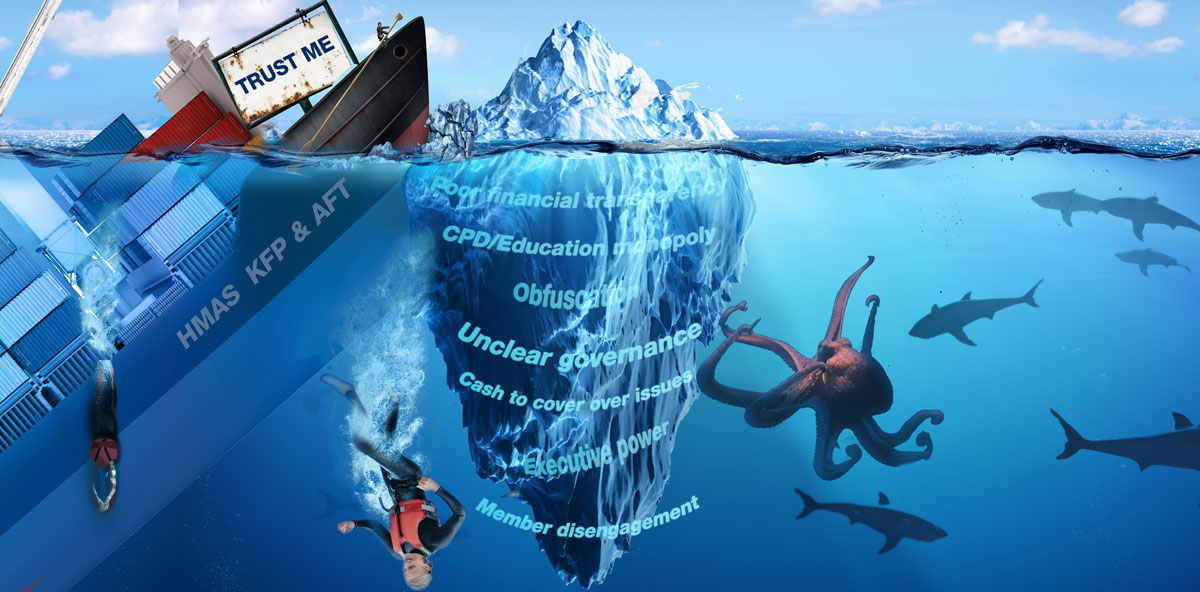The exam fiasco is just the latest fail from an organisation that is sadly sliding further in member engagement and trust, despite the promise of new leadership.
“This is really devastating for my family! I have been off work for a month hoping to end my misery this weekend! The worst is, not making a dime for a whole month and still being treated shabbily and without regard by the RACGP!” ~ Anonymous student, RACGP KFP and AKT exams.
Lack of leadership, hopeless stakeholder management, possible profiteering off the most vulnerable in the system, lack of transparency, poor organisation and a failure to take full responsibility for a disastrous outcome.
It’s hard to know where to start with last week’s RACGP exam failure scandal, but if you add it all up, you have an organisation that hopefully recognises it has a major crisis on its hands, and not just a screw-up of one set of student exams.
It’s a crisis of trust, and if you add it to the last 10 years of mismanagement and resultant member disengagement, it’s possibly the biggest crisis the organisation has faced since nearly going bankrupt many years ago.
It’s a crisis that was the first test of the mettle of the new leadership of the group: CEO Dr Matthew Miles and president-elect Dr Karen Price.
Acting president Associate Professor Ayman Shenouda this week said: “I take full responsibility for what happened and once again apologise to all candidates for what must have been an incredibly frustrating experience.” He said the buck stopped with him. But does it?
Dr Price by rights has some excuse not to participate. She is technically not supposed to comment on college matters until after her official confirmation at the next AGM in November.
But does anyone think that past president Dr Harry Nespolon would have stood by and said nothing to members about such a situation, and then let the interim president take the fall for everyone: the executive, the board, the CEO and the incoming president? That’s seriously too convenient, and frankly, lame.
Professor Shenouda presumably has little involvement in the management of the exams and probably none in the signing of a contract with an online exam provider. How is it all his fault? Why won’t the RACGP executive or board stand up and answer some very pertinent questions being put to them this week by their members, and the media?
Questions like:
- Why did the college proceed with their online provider despite serious issues with the system surfacing during trial exams, including that the use of proctors from India and The Philippines presented some very obvious and serious issues, and that the technology even then was not scaling?
- Why is the cost of running online exams exactly the same as the cost of running them offline? Any education provider, including most universities, will tell you the cost structure is entirely different. What’s the issue with telling everyone what the financials are of nearly $6m in exam fees against costs we have no idea of but strongly suspect are a long way short of that?
- What was the cost of the online provider for this exam series, and what therefore is the profit or loss margin of the college? What was the profit or loss for face-to-face exams in the past and what was the forecast for profit or loss once the exams went online? Most pundits will tell you running exams online is a lot less expensive usually.
- What governance process did the college go through in order to establish the best possible provider to try to ensure something like this didn’t happen? In a statement the college has said that it used Genix Ventures, its provider for eight years. But why would you use your normal provider given how massively different this exam protocol was going to be? Given the college has never run online exams on this scale via video, how much due diligence did it carry out to determine that its established provider could do the job?
- Why was the college OK to continue using proctors for its online exams that were located in India and The Philippines, especially after so many issues in the trial exams? What due diligence did it do around such a protocol and service? It turned out that during the exams, some proctors did not have an adequate grasp of English, answering questions phonetically. On top of the failure, that must have created a lot of additional stress. How is that OK?
- Why won’t the RACGP be transparent around the financials of running all its exams? It has told us that “The RACGP does not disclose details of private contractual arrangements, including fees for service.” In this case, why not? What has it got to hide? Why is this commercial in confidence, especially given the trust issues that have arisen in this crisis?
- When asked to complete and anonymous survey after her exam, one student was subsequently contacted by the RACGP to follow up on her answers. How is that confidential? What if the student had been particularly critical of the RACGP in this instance? How secure is the student’s confidential information really?
- Professor Shenouda is at best a spokesman. He did not personally arrange the logistics and governance of the online exam attempt, nor probably the strategy of communication and protocols in the aftermath. Does anyone realistically think the buck could stop with him? If it did, wouldn’t you sack him immediately? Who really screwed up here? Who really had oversight and final say?
- If the RACGP insists on all the students resitting both exams, why won’t it consider quick assessment reimbursement of other costs, outside of just the exam fee? Those costs for some students were significant. For some, the mental anguish alone should surely be considered carefully by the college if it is going to make every student resit their exams and take longer to finish their registration.
- Why, quite simply, won’t the RACGP tell everyone what actually happened here, and who is really responsible, so a reasonable assessment can be made by members and students of just how much they can trust the organisation into the future, and some compensation arrangement can be made for students?
That’s a lot of very serious questions on the minds of all members of the college at the moment. And it’s not just the students looking for answers.
Some, not the students yet, will probably sigh in a sort of resigned disappointment that nothing seems to have changed at the RACGP since the days of Dr Zena Burgess (PhD) as CEO, and given the current strategy of the college pushing Dr Shenouda in front of everyone (and under a big bus) and attempting to bluster and bluff its way through the crisis with the “the buck stops with me” routine, simply feel that life goes on as normal at the college.
In the past the college hid huge financial mismanagement of things like private investments, and got away with it, because it was generating a massive profit with lots of cashflow and reserves, which it also attempted to represent to members wasn’t the case. In this environment, big screwups were easily diluted into what were impressive year-on-year increases in revenue, profit and cash reserves. The revenue increase was mainly from upping member fees, and in manipulating education provision and fees for members.
If the college lets this new scandal go by, and attempts the same strategy it has in the past of “nothing to see here”, it will be seriously deepening an existing credibility and trust deficit and setting the scene for another decade of the same sort of shenanigans.
A lot of members are disaffected and disengaged (“we’ve seen all this before”) but they are far from stupid. And the college response so far, just in terms of PR and crisis management, is hopeless. In human terms, it’s immensely disrespectful – especially to the students who sat the failed exams and now have to suffer resets and delays and more costs to do new exams, even if their fees are being refunded.
The board needs to meet again and sort this out this week.
Two leaders in particular need to stand up and set things straight. No 1, is new CEO, Dr Matthew Miles. He came to the college with a lot of fanfare and expectation around a new era of transparency and professional management. This is his first test, and so far he is AWOL. Given the nature of the crisis and his circumstances, you might say he is more AWOL than Dr Burgess ever was, and mostly she was never to be found. If Dr Miles doesn’t take charge of this crisis, answer most of the above questions for everyone, and lead from the front in what is a major disaster for the lives and mental health of his upcoming crop of GPs of the future, what does he think will happen between him, them and the college in time?
Dr Miles will have to convince the board to do some abnormal things for the college, and that will not be easy. But he is the CEO. And if the board is running the organisation day to day, and not the CEO, then they need another CEO.
In getting permission to run this crisis better, Dr Miles might take the opportunity to expunge a lot of the probable sins of the past at the same time. Be transparent about the financials, the contracts, and what has been done wrong and right. Let it all out if he can.
In fact, this was, or maybe still is, his opportunity to do that.
Any incoming CEO of any organisation in trouble will spill the dirt of the whole organisation and the previous CEO at the very first chance they can. Usually at the first AGM and subsequent annual report, often with a profit warning, so they can blame everything on the past administration and the past CEO. Wipe the slate clean for a new start, and give yourself some runway, and shareholder trust so you can affect change.
That is CEO 101 (which also includes by the way, PR 101, which says be quick and be honest, and don’t push people lower down under your bus). In Dr Miles’ case, he is new. He has a pass to do it.
Hopefully he was already gearing up to do this behind the scenes – just sorting out his facts and figures.
If he doesn’t, the consequences are probably already clear.
The other person AWOL who probably needs to come out, say something, and get herself involved with Dr Miles, is Dr Karen Price, the president elect.
Because, really, you’re just going to sit back and say nothing while this disaster sweeps over the whole organisation? An organisation you get (sort of) control of in one month? That doesn’t pass the pub test.
Dr Nespolon spent half of his time ignoring the RACGP rules, figuring that most of them were either nonsensical, or designed to prevent the president from exerting any real power over the executive and the board in order to affect meaningful change.
Break the rules Dr Price, please. You are smart, sharp and politically savvy.
If you can learn anything from your predecessor, it’s when to play the college line and when not to. He almost always chose not to when members were getting duded, and that’s most certainly the case now.
The college needs leadership to stand up and fix this now.






